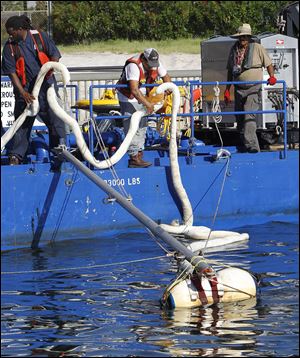
Spill cleanup's costs cloud outlook for BP
6/25/2010
Workers place oil-containment booms into the water in the Perdido Pass in Orange Beach, Ala., where oil from the Deepwater Horizon continues to wash ashore. Estimates of BP's eventual costs of the spill range up to $60 billion, including penalties, damages, and cleanup costs.
On the face of it, BP PLC can easily afford to pay the short-term costs of the oil well that is leaking millions of gallons into the Gulf of Mexico. Last year, the company earned $17 billion, and it ended the year with more than $8 billion in cash.
But concerns about BP's ability to meet all its obligations over the long haul - or even survive the crisis intact - are rattling the government, Gulf Coast residents, and investors.
The ultimate cost of the disaster remains uncertain. Wall Street estimates have put the bill for BP at anywhere from $17 billion to $60 billion, including penalties, damages, and cleanup costs for the disaster.
Beyond the financial costs, the multinational oil giant is facing a growing number of risks that could jeopardize its future. The company is almost certain to face tougher scrutiny from regulators. Opportunities to drill wells may be limited as governments and partners shy away from the company's tarnished reputation.
At the extreme, revenue could be sharply curtailed if the federal government found that the accident was caused by gross negligence and tried to revoke BP's right to operate in the United States, which accounts for one-third of the company's business.
BP, which has spent about $1.5 billion on the cleanup so far, has said it expects to be able to pay all spill costs from its regular operating funds. But in response to the federal government's requests, BP's board met last week to consider its options.
A person with direct knowledge of the discussions said the board was considering three options: suspending payment of the dividend for two quarters, paying the dividend in bonus shares rather than cash, or placing an amount equal to the dividend payment in escrow while continuing to pay for the cleanup separately.
Concerns about the company's ability to balance the competing demands on its cash have prompted investors to dump the stock. Yesterday, BP shares fell 3 percent to $28.74 in New York trading, contributing to the stock's nearly 50 percent plunge since the April 20 accident.
"The costs are going to be significant, yes, and potentially they are an existential threat to BP," said Bruce Bullock, director of the Maguire Energy Institute at Southern Methodist University.
In the bond markets, the cost of insuring against the possibility of BP defaulting on its debts has soared. The price of a $10 million five-year credit default swap has gone from $50,000 a year before the spill to $425,000.
In recent days, the administration has raised the prospect of forcing BP to pay the salaries of workers affected by the government's moratorium on offshore oil drilling. Legal experts said the argument had little chance of standing before the courts.
Over time, the drop in BP's market value could turn the company into a target for a takeover by Western rivals or even one of Asia's national oil companies, although questions about the company's financial liability for the spill would give pause to potential acquirers.
Last year, BP operations generated $27.7 billion in cash.
The company operates the biggest oil field in North America - Prudhoe Bay in Alaska's North Slope. Its refineries in Texas City, Texas, and Whiting, Ind., are among the five largest in the country.
Globally, the company had 63 billion barrels of resources at the end of 2009, including more than 18 billion barrels of proven reserves.
With each passing day, however, the bills keep growing. If the spill were somehow stopped today, the cost to BP could be as little as $9.6 billion, according to Kevin Book, an analyst at Clear View Energy Partners. If the spill were to stop in July, 90 days after the accident, it would cost as much as $29.2 billion, he said.
BP projects that it will not be able to completely stop the spill until August, when it hopes to complete the drilling of a relief well to kill the leaking one.
Fadel Gheit, a senior oil and gas company analyst at Oppenheimer, estimates that BP eventually will face $20 billion in claims and cleanup costs. Punitive damages to the federal and state governments could double that figure. Mr. Gheit said the maximum cost could be as much as $60 billion, paid over many years.
Costs include payments for lost tourism and commercial fishing revenue in the states most affected - Alabama, Florida, Louisiana, and Mississippi.